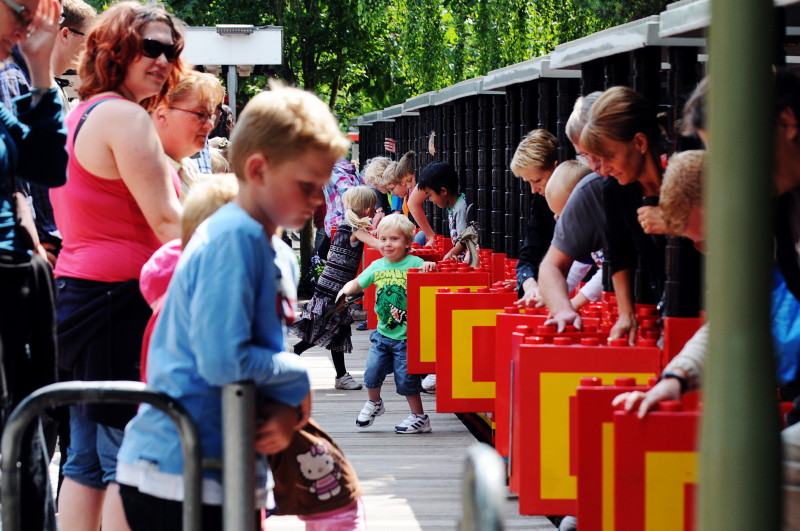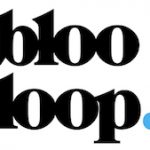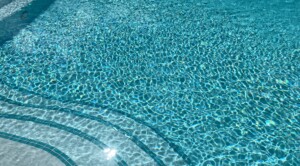Merlin Entertainments is undoubtedly one of the most exciting companies in the world. A global leader in branded, location based family entertainment, it currently operates over 60 attractions across 13 countries and 3 continents.
Charles Read caught up with Mark Fisher (below), MD Resort Theme Parks, to talk about his 20 year career, the unparalleled commercial success of Merlin and its plans for the future.
 What is your current role?
What is your current role?
I am Managing Director Resort Theme Parks for Merlin Entertainments and I look after 6 businesses, the Alton Towers Resort, Thorpe Park, Chessington World of Adventures and Warwick Castle in the UK, Heide Park in Germany and Gardaland Resort in Italy. Merlin has 3 operational MDs, including myself and a fourth MD who runs the property development group, all of whom are part of the Senior Management Team and report direct to the CEO, Nick Varney.
How did you get started in the industry?
I got a holiday job when I was 16 at Alton Towers -my local park – and started off as a costume character. I went back to work there each holiday until I was 21.
In 1990, after graduating in Recreation Management , I was working part time in maintenance and there was an Alton Towers staff party around Christmas at which new Operations Director, Martin Barratt (now CEO, The British Association of Leisure Parks, Piers and Attractions, BALPPA) and new Marketing Director, Nick Varney (now CEO, Merlin) were present. Dressed in my overalls and perhaps emboldened by the glass of mulled wine in my hand I asked them for a job. 3 weeks later a role came along, “Events Coordinator”.
I had a variety of roles within The Tussauds Group. At Alton Towers I started in trade marketing, then I worked in International sales for Madame Tussauds, Rock Circus and Warwick Castle after which I went back to Alton as Business Development Manager.
In 1995 you resigned from The Tussauds Group and went to Vardon Attractions, a predominately UK based aquarium company. How did this move come about and was it a huge leap of faith?
By 1995 I had already worked with Nick for 5 years and we had worked well together. Clearly I learnt, and continue to learn, a lot from him, I like that; I like his style – he is a straight forward, honest guy. As CEO he has insight and drive, and I’ve never known him to be unfair.
Was it a leap of faith? To a degree, I think so. I’d never really heard of Vardon. My parents were supportive but later told me they’d thought I was nuts! But it was the right move, I needed a new challenge.
I remember going to Blackpool’s SEA LIFE, and thinking, “what have I done!?” – Tussauds was the big name back then. In ‘95 Vardon had 2 overseas businesses, Dungeons in London and York and 16 UK aquariums, half of which were heading down hill at a good pace in business terms. We had to put a strategy together urgently to resurrect the business – and we knew that meant growth in Europe. This was first to stabilise the existing businesses and identify and move forward those that were growing. Then we sub-branded the smaller ones and sold them. These were good businesses – aquariums in St Andrews , Southend, Portsmouth and Hastings – but they didn’t fit into the bigger picture. We then invested this money overseas, and opened our first SEA LIFE property in Germany in Timmendorfer Strand. We are now the leading attractions operator in Germany – with 10 midways attractions – 8 SEA LIFE, a Madame Tussauds and a LEGOLAND Discovery Centre in Berlin; and 2 theme parks Heide Park and LEGOLAND Deutchland.
In late 1998 Merlin Entertainments Group Ltd. was formed as Nick Varney, yourself and the senior management team of Vardon Attractions completed a management buyout of the company. Backed by private equity funds, acquisitions of Legoland Parks (2005), Gardaland (2006) and The Tussauds Group (2007) followed, increasing the size of Merlin by a factor of ten. Tell us about Merlin, what is it that has made it so successful?
 Merlin has always been good at plotting a long future course. When we talk to analysts, a strength we have is that between the top 6 guys we have over 130 years experience in theme parks and attractions. I think this is key and a thing that differentiates us. It’s not just about a great management team it is because this – attractions- is what we do, it’s what life is for us, and it’s what we love. We know how to realise the potential and get the very best value out of an attraction by focusing on what really matters and offering a quality product and quality service which give our visitors truly memorable experiences. We don’t employ people who just do a job. Merlin people love the business and are passionate about it; they don’t do it because they might make money.
Merlin has always been good at plotting a long future course. When we talk to analysts, a strength we have is that between the top 6 guys we have over 130 years experience in theme parks and attractions. I think this is key and a thing that differentiates us. It’s not just about a great management team it is because this – attractions- is what we do, it’s what life is for us, and it’s what we love. We know how to realise the potential and get the very best value out of an attraction by focusing on what really matters and offering a quality product and quality service which give our visitors truly memorable experiences. We don’t employ people who just do a job. Merlin people love the business and are passionate about it; they don’t do it because they might make money.
Our taking over the four LEGOLAND Parks and the Tussauds Group gave each of these businesses a long term, stable future based on continuous investment and real customer understanding. In Merlin every single business has a 5 and 10 year business plan/investment cycle. I can tell you now what money we’ll invest in Alton Towers in 2014. So perhaps the biggest thing we’ve brought has been stability. We know where we want to go and we work with the teams at each individual attraction to help us map the route to get there.
Merlin’s ownership structure is currently KIRKBI 36%, Blackstone 34% and CVC 28%. In today’s economic climate most companies struggle to get finance yet Merlin seems able to push ahead with acquisitions. Please can you tell us about Merlin’s relationship with its venture capitalist backers?
With Hermes (Hermes Private Equity, an investor in 2003), we wanted to invest and expand quickly, they couldn’t support this at the time, so we approached  The Blackstone Group. Nick (below right) got a contact, sat down with them about our vision of the future, the company we all believed we could build and they bought into our vision and made what was at the time the smallest deal Blackstone had ever done. We were right and it is that vision and success which has kept our major shareholders there with us through the last 5 years.
The Blackstone Group. Nick (below right) got a contact, sat down with them about our vision of the future, the company we all believed we could build and they bought into our vision and made what was at the time the smallest deal Blackstone had ever done. We were right and it is that vision and success which has kept our major shareholders there with us through the last 5 years.
VCs (venture capitalists) get a lot of negative publicity but I have to say that our experience has  been very positive – they have given us the capital and freedom to grow a fantastic company. They have been very supportive throughout and have allowed us to invest money, even when on occasion this has involved taking us on a bit of faith. They have also let us run the business our way.
been very positive – they have given us the capital and freedom to grow a fantastic company. They have been very supportive throughout and have allowed us to invest money, even when on occasion this has involved taking us on a bit of faith. They have also let us run the business our way.
CVC (private equity firm CVC Capital Partners, which invested in Merlin in June 2010) had apparently watched our progress and been interested in us for a long time so when the opportunity arose they were very keen to buy in to the company. We also have a great relationship with KIRKBI (the Danish family trust that owns Lego). We bought the Legoland Theme Parks from them initially and as part of that deal they kept a small shareholding not just because maintaining the link between the toy and the Parks is important, but more because they liked our story so much. This hadn’t been planned originally but has worked well for both of us.
Please tell us about the Merlin Culture and how you maintain this across all the different businesses
We spend a lot of time talking about people at Merlin. We are the only business in the sector I know that has a product excellence director, whose sole purpose in life is to check we are doing as well as we should be. He is quite inspirational; I call him “Minister without Portfolio” because although he has no direct reports, he has to deal with every senior executive across the company. His role is seen as very positive by all the managers, who are very aware of the KPIs (key performance indicators) at Merlin. We also introduced product excellence managers into parks now too. All the properties and the staff want to be high up on the Mystery Shopper league and get strong marks for satisfaction and value for money. We want 90% of our guests to say they have had a good or very good time with us; 80% isn’t good enough.
We’ve been fortunate in that we have bought in good management. There are 11 people on the Executive board, and they are a mixture from all the  companies we have bought, which is nice to see. Different countries, different cultures, but you often think, “Blimey we’re not that different”, because we all love the theme park and attraction business; like minded people. As a result we have a very strong culture and values in the company – which are really part of everyone’s DNA – based around trust, honesty and care and commitment – but above all making it fun – that is the business we are in after all.
companies we have bought, which is nice to see. Different countries, different cultures, but you often think, “Blimey we’re not that different”, because we all love the theme park and attraction business; like minded people. As a result we have a very strong culture and values in the company – which are really part of everyone’s DNA – based around trust, honesty and care and commitment – but above all making it fun – that is the business we are in after all.
You have said, “With every business we have, we try to keep the ‘ownership’ at a local level”. How is this achieved?
We promote a culture of ownership in the business. Two reasons: first, Merlin is not big in the centre, especially for a business which is worth over £2billion, so we simply wouldn’t have the infrastructure to micromanage all these attractions; and second, ownership means that it’s their business, their ideas and their responsibility. Of course we develop strategic directions and views centrally together with fixing capex cycles, clarity on the brands and 5 to ten year plans, but our role is more one of guidance and giving them the teeth to make the decisions. With Gardaland I will be part of the team putting together their business plan but I won’t be leading it. For example, we have four different fast track operations and they are all good or bad in their own ways, with each business owner arguing theirs is the best. Were not going to go to a business and say you need to use X or Y as one solution might work well in one park but less so in another. We also have great people on the development side too, so there is a good amount of support and experience the businesses can call on. We are not “top heavy”. Indeed if you lopped the head off Merlin, in the short term the parks would simply carry on functioning day to day.
Core strategies at Merlin are 1. Organic growth 2 continued roll-out of Midway attractions 3. Transition of Theme Parks into Resort Theme Parks and 4. Development and acquisition. How is this going and which territories are you looking at?
Our strategy is for expansion in the US, in mid-size to large cities. We have good ambitions for Asia and though we are not yet in Australasia, we are currently chasing down opportunities (Nb. Since this interview Merlin has announced the purchase of Sydney Attractions Group).
The US is proving very successful for us: Phoenix Sea Life Centre (SLC) has done really well and we have recently announced new midway developments in Dallas and Atlanta. LEGOLAND California also continues to be brilliant. The new (Legoland) waterpark opened this summer has gone bananas, to the point where we have operational issues about the numbers, a quality problem to have! (see LEGOLAND® Water Park Receives Industry Innovation Award) This will help us design the next one. The success of California also augurs well for our biggest new development next year – LEGOLAND Florida.
We are also creating multi day theme park resorts with the addition of accommodation and second gate attractions, and from 2012 intend to open at least one new hotel a year for the forseeable future.. Gardaland for example, now has 2nd gates, we have planning permission for a second hotel and the park is doing really well. At Alton Towers, the “Extraordinary Golf” has paid itself back in less than 3 years and a hotel will open at LEGOLAND Windsor in 2012.
One great thing with the resort hotels is we’ve got real buy in from everyone. We have created a culture that where these people genuinely want the guests to have a great time. There has been lots of great feedback from colleagues and friends about their stays at Merlin hotels and we have had big blue chip FMCG companies asking to come and see how we’ve created this culture.
 Underpinning this, our big strength is that we know where we want to go. And our aspirations are credible, not pie-in-the-sky, because we’ve done it. Were grounded, this business is what we do. We don’t spend a lot of time in offices. We have a new head office now, but until very recently we were above a record shop in the old part of (Poole, Dorset) town.
Underpinning this, our big strength is that we know where we want to go. And our aspirations are credible, not pie-in-the-sky, because we’ve done it. Were grounded, this business is what we do. We don’t spend a lot of time in offices. We have a new head office now, but until very recently we were above a record shop in the old part of (Poole, Dorset) town.
Lego has a superb, sophisticated mapped out piece of work about where their markets are strongest. They help guide us to where the quicker wins are. Some sites are no- brainers so you can build a park. In others you might dip a toe in the water with an LDC (Lego Discovery Centre). LDCs are working very well. We’ve learnt from every one, improved the product each time. Manchester was the fastest numbers we’ve ever had in an LDC. In fact, it made us look at the UK again, as to have a runaway success in a mature market was phenomenal.
In addition to the development of our core business one other strand of our strategy is growth by strategic acquisition, and now CVC has come on board, we have strengthened our ability to acquire even more and to move into new markets like Australia and New Zealand for example and the Far East (LEGOLAND Malaysia opens in 2012). But we are still just scratching the surface.
In China for example the opportunities are staggering. Something like 50 or 60 of top 200 cities by 2020 will be in china. Gauging the time to go in is vital. Too early and the market criteria might not be quite what they should be. Go in late and your competitors are already there. I’ve no doubt that Merlin will be in India at some stage, it’s just a question of time. But right now, there are better, safer opportunities for us. 60 plus business is still quite small. It’s bloody exciting.
Whilst the group’s strength is in branded attractions, what value does Merlin itself have as a brand?
Whilst the Merlin brand has a presence in the industry, its key strength is the portfolio of really strong brands it has. Merlin will never get near that. It does have value on a wider business level – attracting quality graduates for example- and the industry knows who we are and what we do. Visitors might think it’s a Merlin attraction, so know it will be certain quality and give a certain value for money. However, the parks need individuality, distinctive features and characteristics. Each major park has its own brand but also a number of sub-brands. These can be coasters such as SAW, Nemesis, Air and Stealth or Miniland and the Fire Brigade Ride at LEGOLAND. Were there a spot awareness survey of UK attractions, Merlin as a brand wouldn’t be high up, but then we’d own most of the top ten.
we’d own most of the top ten.
That said we are increasingly using the Merlin brand very effectively to link attractions together for marketing purposes – most obvious here is the Merlin Annual Pass – first introduced into the UK two years ago, and then this year also into Germany – this has not only proven commercially very successful for us but also probably represents the best value leisure product on the market!
A recent report suggested that the UK has dropped out of the top 25 tourist destinations. How do you think the government is helping the UK’s attractions industry?
The bottom line is that this Government and its predecessor have done very little for the visitor attractions industry, or for UK tourism generally and yet they hold the sector up as one of the potential success stories of the country and a huge potential creator of new jobs. A straightforward question could be asked: what demonstrably has been done in our industry to help us in the last ten years? I can think of nothing. What has been done to hinder us? The list goes on, starting with lottery funding, free museums and the VAT rate. (see also Is the UK Government doing enough for Tourism?)
Part of the problem is there is no coherent strategy on tourism; there have been lots of bodies, quangos, and regional development agencies with no clear thought process. The VAT situation for example (the UK government charges tax on top of entrance prices at 17.5%, shortly to go up to 20%). We run businesses in other countries with VAT of 5% and we get more visitors and make more money to invest in the businesses – in rides, infrastructure, services and staff training and development – studies show that low VAT is tax positive because of the extra revenue. To me, the arguments are crystal clear and we would dearly love to see a reduced VAT rate on hotels and visitor attractions. We are on record as saying we would pass it on to the public and also invest in more training. The issue is we’re in tough times, does anyone politically have the courage to challenge this? BALPPA has been good and has become an organisation with teeth, recognised as a body to talk to.
Does Merlin Tweet?
We are doing a lot with technology but the difficulty we face is the pace of change is so rapid. We have Twitter and Facebook pages for all the big parks/attractions. Thorpe Park particularly is brilliant with social networking, probably because their market is IT savvy teenagers and young adults. We have regular meetings in which the park’s marketing directors exchange ideas and have found that social networking is particularly strong for niche marketing. Gardaland has over 250, 000 people who “like” its Facebook page and this is a superb promotional marketing channel. The parks also have various apps for IPhones, some streaming live in-park footage. (See also Theme Parks – From E commerce to M commerce)
I am aware that part of the issue is spotting which technologies will last and which will not as it can be tough sorting the wheat from the chaff. I remember various articles predicting either the death of theme parks or cinema or even the book, all due to be usurped by new technologies. We once added some interactive PC kit to one of the SLCs, less than a year later it was obsolete.
How do you attract and recruit Merlin people?
The opportunity for graduates joining Merlin are fantastic and we get over 1, 500 applications for our 12 graduate places. We make some choices from the CVs; look at their academic background and for things that stand out. Generally, the minimum graduate qualification will be a good degree. Perhaps more importantly, we have assessment days, with practical exercises to see how they manage and interact in different situations. They also need to have a passion for what we do. We invest in training and have a separate plan for each graduate, expecting them to be running a business within 4 years. The MDs mentor the graduates and we each know our 3 or 4 well. Nick goes to meet them all. You wouldn’t necessarily get this degree of contact with senior executives in a company our size elsewhere.
With many overseas attractions, we also need the right people geographically. We are actively recruiting in China as we know we will need people who know the language and the culture. Local teams are a central part of our ethos.
 Theming, Innovation and storytelling: has Universal’s Harry Potter raised the bar?
Theming, Innovation and storytelling: has Universal’s Harry Potter raised the bar?
We talk about “compelling propositions” a lot in Merlin. An idea might be an engineering miracle but it needs to be compelling enough for people to want to get in their car and drive to experience it. Universal get it, Disney get, we get it.
Th13teen at Alton Towers was a big piece of innovation for example, we went to Intamin, and said, “we need something new”. SAW – The Ride at Thorpe Park on the other hand is actually a Gerstlaeur ride bought off-the-shelf but you’d not know this because of the extensive theming. A ride like Rita at Alton Towers, whilst being a brilliant coaster is not really a themed ride – theming was an afterthought – and I can’t think we would add a ride without a story now. Nemesis at Alton Towers is till my favourite coaster after 16 years, though I am biased as I was involved in its opening and I remember blasting the bedrock out ! But it still works for many reasons, not the least of which is its brilliant theming. Huge theming, storytelling and creating the ride as an experience are the way to go. If you look at the new rides at Heide and Gardaland they each have comprehensive back stories, in fact we are not even calling them “rides” in half of the PR.
In the SLCs, the ocean tank is the “big ride”. Because we come from a more entertainment/show based background, we dress the tank and theme it, basically taking the theme park principal and transferring it to aquariums. So you might see bigger fish elsewhere but we’d have a plane crashed in the middle of the tank. Ours would be magical. Even at Madame Tussauds (we now have 10 around the world with 2 more to open in 2011) – it is all about showmanship – MT is the ultimate celebrity experience and is very interactive now with visitors really getting up close and personal with their heroes.
Which attractions do you admire?
In Europe, Europa Park is fantastic quality, it is operated very well. You’ve got to admire Harry Potter at Universal and we know Busch quite well, the parks at Tampa  and Williamsburg are class parks.
and Williamsburg are class parks.
One attraction in the UK, BeWilderwood, impressed me. I like the innovative style and I admire anyone in this industry who’s got the courage to try something new. I don’t necessarily think innovation has to be technology based and BeWilderood is an example. The park I have visited more than any other, is actually a tiny farm park/petting zoo just a couple of miles from my home. I’ve been there many, many times with my family. Although it is a very simple operation, it works well , is well maintained, has a nice café with good food and has clean toilets. They get the basics right.
Merlin is now the clear market leader in Europe and second only to Disney in terms of visitor admissions with a vision to become "the world-wide leader in branded, location based entertainment". Then what?
I’ve been asked before, “What is success for Merlin?”. The answer is, it’s not about growing and selling the company, its about one day looking at this fabulous team that is rocking around the world and knowing you’ve been part of growing that. It’s not about where we’ve been, it’s about where we’re going.
Images all kind courtesy Merlin Entertainments, from the top: Babbi Natale a Gardaland Magic Winter, Mark Fisher, Squirrel Nutkin ride at Alton Towers, Splash Landings Hotel at Alton Towers, Jellyfish at Chessington World of Adventure/Sea Life, Nick Varney, SAW at Thorpe Park, baby binutrong at CWOA, Wild Asia tuk-tuk at CWOA, Nemeis at Alton Towers.










